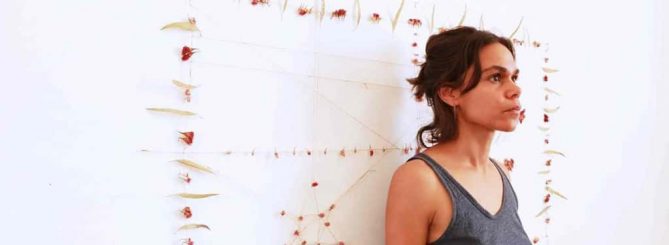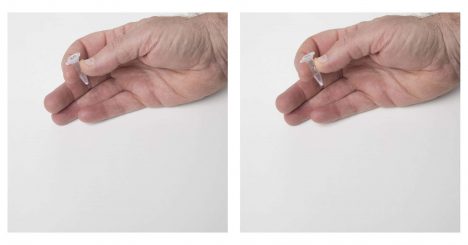The Geography Artist in Residence (AiRG) Program is an innovative initiative of the School of Geography in association with Ian Potter Museum of Art at the University of Melbourne.
The AiRG works with researchers to rethink ways of exploring and expressing the geographical complexities inherent in the social and environmental challenges of the present and the future. Recognising that the arts have long played a major role interrogating human society and its relationship with the natural world, the program supports practicing visual artists in critical engagement with contemporary geographical concerns.
The program facilitates sustained dialogue between the artist and Australia’s most respected thinkers in the fields of physical and human geography, working to provoke new ways of thinking about cutting edge geographical ideas and generate discussion amongst a broad audience.
The AiRG participates in the everyday milieu of the school with opportunities to join researchers at their field sites and work at the coalface of their chosen geographical themes. The program challenges both artist and researchers to rethink conceptual understanding of wider geographic matters and culminates in a special event and exhibition of the artistic work produced.
Regional Arts Collaboration 2018
In 2018, a new artist-in-residence programme was launched by the University of Melbourne Regional Arts Collaboration (UoM RAC) in partnership with the Shepparton Art Museum, that aimed to link artistic practice with university research connected to the themes of nature, environment and place. This is an initiative of the Melbourne Sustainable Society Institute (MSSI); the School of Geography Artist in Residence Program; the Faculty of Veterinary and Agricultural Sciences Dookie Campus; and the Ian Potter Museum.
Katie West and Fayen d’Evie were the inaugural artists-in-residence and the second Geography Artist in Residence. Their Museum Incognita project explores what a decolonised museum could be, one that proceeds from custodial ethics, and invites embodied readings of complex histories. For the Regional Arts Collaboration, Katie and Fayen walked water flows, as a method of listening to stories of care and disturbance across Yorta Yorta and Taungurung country.
Their learnings as they untangled complex histories of possession, dispossession, degradation and restoration, and traces of conversations and performative activations that occurred, are shared through an evolving stream of fragmented memories and reflections:
The stream will shift its course over time, as the artists iteratively revisit, and begin to map the interconnectedness of flows of water and story across country
Recommended (th)reads:
https://wintonwetlands.org.au/
University of Melbourne Acknowledgements:
This project took place on the land of the Traditional Owners of the Wurundjeri peoples, and in Shepparton, the land of the Yorta Yorta peoples. We acknowledge the hospitality of traditional owners on their land where sovereignty was never ceded and all those Aboriginal and Torres Strait Islander peoples living in the Shepparton region. We pay our respects to Elders past and present. The project was funded by the University of Melbourne through grants from Chancellery Engagement (2018), the Melbourne Sustainable Society Institute, and the School of Geography Artist-in-Residence Program. We also acknowledge the invaluable support provided by the Ian Potter Museum of Art and the Faculty of Veterinary and Agriculture Sciences, particularly the staff based at the Dookie campus. This project would not have been possible without the project’s major partner, Shepparton Art Museum, who opened their doors to the Residency.
Katie West is a Yindjibarndi woman from Western Australia, who focuses on the renewal of human connections with and within the more-than-human world. Her previous bodies of work include ‘Decolonist’, which considered the practice of meditation as a means to decolonise the self, and ‘muhlu garrwarn/cool time hot time’, which engages with natural dyeing processes and text scores as ways to participate with the seasons.
Fayen d’Evie is based in Muckleford, rural Victoria. She explores blindness as a radical critical position, attuned to complex embodiment, sensory translations, material histories, ephemerality, obscurity, the tangible, and the invisible. She is also the founder of 3-ply, which investigates artist-led publishing as an experimental site for the production, translation and archiving of knowledge. In addition to a fine art background, d’Evie holds a Ph.D. in environmental studies. Her work featured in the Eavesdropping at the Ian Potter Museum of Art, 2018.
Previous artist in residence
Linda Tegg was the inaugural School of Geography Artist in Residence. She works with photography, performance, video, and installation to investigate the contingent viewing conditions through which we orient ourselves in the world.
In doing so she operates within ecology and illusion – a world of images that form our idea of the natural and our interactions with others to produce work oscillating between the forensic and the romantic. This is undertaken through collaboration with non-human kinds and cultural institutions to reflect upon the impulses and methods used to draw others into the ‘world-for-us’.
As the AiRG Linda sought to interrogate and integrate herself in the wide spectrum of Geographies examined at Melbourne, lingering on concepts that refract concerns regarding the doing of geography and the practices of looking. A key theme routinely probed by her work in progress is the notion of ‘Sensing Climate’. This she has done through extensive academic interviews, fieldwork participation and the production of visual film work gathered during a visit to Timor-Leste with a field class.
In a three-day Open Studio in December 2018, The Ian Potter Museum of Art presented a window into Tegg’s year-long investigations into the practice of looking, a series of experimental works that seek to make visible the systems and structures through which we orient and find meaning in the world.
Linda’s work has been extensively exhibited in Australia, Mexico, the United States, and Europe. She collaborated with Architects Barracco+Wright as Creative Directors of the Australian Pavilion at the 16th International Architecture Biennale, Venice, 2018. Tegg was the Samstag Scholar of 2014 and the Georges Mora Foundation Fellow of 2012. Linda is Lecturer in Creative Practice at Deakin University.


